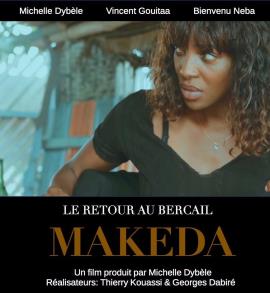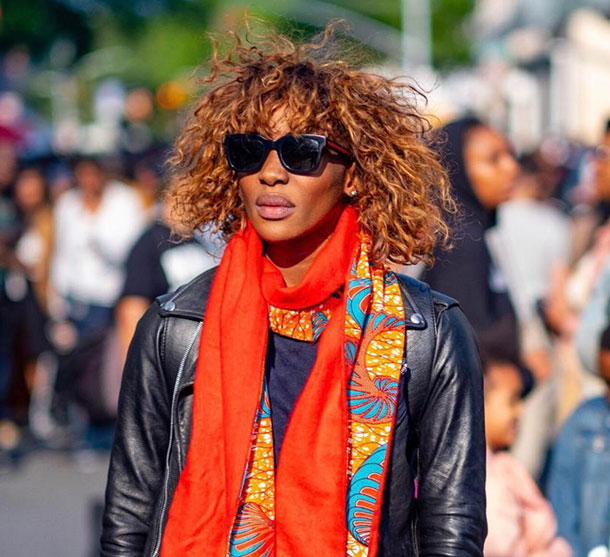An Interview with Michelle Dybele
Michelle Dybele is a French actress, film producer and entrepreneur of Central African heritage.
Josefina Bonsundy Nvumba, Founder of Rootencial, spoke to Michelle about her various creative ventures, from her short film produced in Côte d’Ivoire and featured at Cannes to the scarves inspired by her grandmother and African history.
Hi Michelle! You do so many different things; how would you describe yourself?
I’ve lived my life as if it was a theatre production, in which I’ve given myself the roles that make me happy. First and foremost, I am an actress. I used to be a model but today I am an actress, film producer and entrepreneur. I know that may be confusing; it’s a lot of different things!

Tell us about your journey as an actress. How did it all begin?
I’ve always been passionate about acting, theatre, and cinema. I’ve been involved in theatre since I was really young. It all started there.
I went on to produce a short film called Makeda, about a young Ivorian woman born in France but who had never been to Côte d’Ivoire until her father died. She arrived in the country for the first time for his funeral and encountered a culture shock.
The film tells the story of how her father’s best friend – a white Frenchman who had lived in the country for many years – taught her about local customs, how to speak and how to behave. Makeda was featured in the Short Film Corner at the Cannes Festival in 2017.
From the silver screen to scarves: how did that happen? What inspired you make this leap into fashion and business?
When I was younger, I had an accident which left a large scale on my neck. I was always trying to cover it up.
One day, my grandmother from the Central African Republic came to visit us. I was working to save the money to have the scar removed, but my grandmother persuaded me not to. “This scar is your story, it’s your life,” she said. “It’s something important. You shouldn’t get it removed.” I listened and I kept it.
My grandmother left me some African fabric, which is the only thing of hers that I now possess. An idea came to me: I wanted to create something new in the fashion world, and it became clear to me that it should be in scarves. I didn’t know how to make them at first, but I wanted to mix cotton with wax from African fabrics.
Seeking to build a brand, I started to research historical African kings, queens and warriors – and decided to endow my scarves with their names. My roots influence my work today; my short film was produced in Africa, too. It’s a duty for me and for the majority of Africans to do things that pay tribute to our heritage.
The scarves aren’t really a business for me. They’re a tribute to my grandmother; a tribute to our kings, queens and warriors

Which challenges have you had to overcome on your journey?
I’m a very impatient person. I’ve learned and I’m still learning how to be more patient and disciplined. They say that Thomas Edison had to try and fail thousands of times before he made a breakthrough with the lightbulb.
It’s about giving yourself a routine, doing the same things over and over again until you attain perfection. Discipline is how all of us become better.
Complete the following sentences:
“To live by inspiration.”
“Africa’s queens and women warriors, such as Cleopatra, Anna Nkinza, and Seh Dong Deh.”
“Choose a voice and go all the way to the end.”
“Make history.”
Pingback: ItMe.Xyz
Pingback: URL
Pingback: psychologist san diego
Pingback: pgslot
Pingback: ทัวร์เวียดนาม
Pingback: สล็อตออนไลน์ เว็บตรง ไม่ผ่านเอเย่นต์
Pingback: รถ4ล้อใหญ่
Pingback: disposable thc vape carts near me
Pingback: บาคาร่าเกาหลี
Pingback: สล็อต เครดิตฟรี
Pingback: Jun88
Pingback: สล็อตวอเลท ฝากถอนเงินไว ไม่ต้องบันทึกสลิปแจ้ง
Pingback: นักสืบ
Pingback: สล็อตออนไลน์เกาหลี
Pingback: pgslot
Pingback: pool enclosure screen
Pingback: ติดตั้ง ais fiber
Pingback: เช่ารถตู้พร้อมคนขับ
Pingback: nutrition
Pingback: ทางเข้า lucabet
Pingback: painting service Auckland
Pingback: จองตั๋วรถทัวร์นครชัยแอร์
Pingback: kc9
Pingback: ปั้มติดตาม
Pingback: lg96
Pingback: ซักผ้าอุตสาหกรรม
Pingback: สูตรสล็อตทดลองเล่นฟรี ทางเลือกเดิมพันดีที่สุด
Pingback: Plinko App
Pingback: slot99
Pingback: pgslot168
Pingback: скачать pin-up
Pingback: ยาแก้ร้อนใน
Pingback: esports domains
Pingback: King Chance
Pingback: chimney sweep in Chester
Pingback: best probiotic for french bulldogs
Pingback: french bulldog rescue
Pingback: battlebit hacks
Pingback: unlock all operators
Pingback: download delta cheats
Pingback: warzone ESP
Pingback: undetected finals hacks
Pingback: นิยาย
Pingback: pgslot
Pingback: candy factory
Pingback: mexican candy store
Pingback: chamy rim dips
Pingback: french bulldog for sale near me
Pingback: condiciones climaticas queretaro
Pingback: moped rental isla mujeres
Pingback: rent a yacht in cancun
Pingback: french bulldog puppies for sale $200
Pingback: cheap french bulldog puppies under $500
Pingback: black frenchies
Pingback: hairdresser in houston
Pingback: linh hoang
Pingback: alexa collins
Pingback: sole mare vacanze t-shirt
Pingback: french bulldogs to rescue
Pingback: 늑대닷컴
Pingback: family ho
Pingback: 늑대닷컴
Pingback: wix seo
Pingback: boston terrier for sale in massachusetts
Pingback: dog probiotic chews on amazon
Pingback: fertility institute of nj
Pingback: dr kim acupuncture
Pingback: FB URL Shortener
Pingback: we buy french bulldogs
Pingback: mexican candy store near me
Pingback: french bulldog texas
Pingback: mexican candy store near me
Pingback: mexican candy store near me
Pingback: mexican candy store near me
Pingback: french bulldog puppies for sale in texas
Pingback: french bulldog shop
Pingback: chanel dog bowls
Pingback: coco chanel dog collar
Pingback: playnet
Pingback: gaming
Pingback: crypto news
Pingback: brazilian jiu jitsu in houston
Pingback: magnolia brazilian jiu jitsu
Pingback: bjj jiu jitsu magnolia texas
Pingback: clima en chimalhuacán mañana
Pingback: minnect expert
Pingback: boston terrier french bulldog mix
Pingback: frenchie yorkie mix
Pingback: frenchie bully mix
Pingback: probiotics for english bulldogs
Pingback: probiotics for french bulldogs
Pingback: french bulldog poodle mix
Pingback: floodle
Pingback: french bulldog chihuahua mix
Pingback: Dog Papers
Pingback: How To Get My Dog Papers
Pingback: Dog Papers
Pingback: How To Obtain Dog Papers
Pingback: How To Obtain Dog Papers
Pingback: Dog Registry
Pingback: Dog Registry
Pingback: How To Obtain Dog Papers
Pingback: How To Obtain Dog Papers
Pingback: Dog Papers
Pingback: Dog Registry
Pingback: Dog Registry
Pingback: Dog Papers
Pingback: Dog Registry
Pingback: Dog Registry
Pingback: Dog Registry
Pingback: Dog Registry
Pingback: Dog Registry
Pingback: sugar land seo company
Pingback: french pitbull
Pingback: dog registration
Pingback: french bulldog rescue
Pingback: isla mujeres condos
Pingback: rent a yacht in cancun
Pingback: golf cart rentals isla mujeres
Pingback: French Bulldog Adoption
Pingback: French Bulldog Rescue
Pingback: French Bulldog Rescue
Pingback: French Bulldog Adoption
Pingback: French Bulldog Adoption
Pingback: French Bulldog Rescue
Pingback: French Bulldog Adoption
Pingback: French Bulldog Rescue
Pingback: clima tultitlán
Pingback: exotic bullies
Pingback: how to get papers on a dog
Pingback: golf cart rental isla mujeres
Pingback: grey frenchie puppy
Pingback: rent a golf cart
Pingback: golf cart rental
Pingback: French Bulldog Puppies Near Me
Pingback: French Bulldog For Sale
Pingback: Frenchie Puppies
Pingback: Frenchie Puppies
Pingback: French Bulldog For Sale
Pingback: Frenchie Puppies
Pingback: French Bulldog For Sale
Pingback: French Bulldog Puppies Near Me
Pingback: Kim Miyang Acupuncturist & Herbalist
Pingback: crypto news
Pingback: need money for porsche
Pingback: chanel newborn clothes
Pingback: brazil crop top
Pingback: chanel activewear
Pingback: coco chanel hats
Pingback: marfa prada poster
Pingback: frenchie chihuahua mix
Pingback: floodle puppies for sale
Pingback: frenchie chihuahua mix
Pingback: floodle puppies for sale
Pingback: floodle puppies for sale
Pingback: floodle puppies for sale
Pingback: fart coin price
Pingback: folding fan
Pingback: french bulldogs
Pingback: lilac french bulldogs
Pingback: lilac french bulldogs
Pingback: blue color french bulldog
Pingback: fluffy french bulldog
Pingback: generative engine optimization
Pingback: aeo
Pingback: isla mujeres golf cart
Pingback: clima cancun
Pingback: probiotic dog treats
Pingback: french bulldog puppies for sale houston
Pingback: dump him shirt
Pingback: in vitro fertilization mexico
Pingback: micro frenchies
Pingback: joyce echols houston
Pingback: in vitro fertilization mexico
Pingback: cover band los angeles
Pingback: kauai weather
Pingback: how to obtain dog papers
Pingback: isla mujeres climate
Pingback: french bulldog rescue
Pingback: linh hoang houston
Pingback: French Bulldog Registration
Pingback: linh hoang
Pingback: French Bulldog puppies in San Antonio
Pingback: bitcoin
Pingback: French Bulldog Texas
Pingback: French Bulldog puppies in Austin
Pingback: dog registry
Pingback: dog registry
Pingback: dogs papers